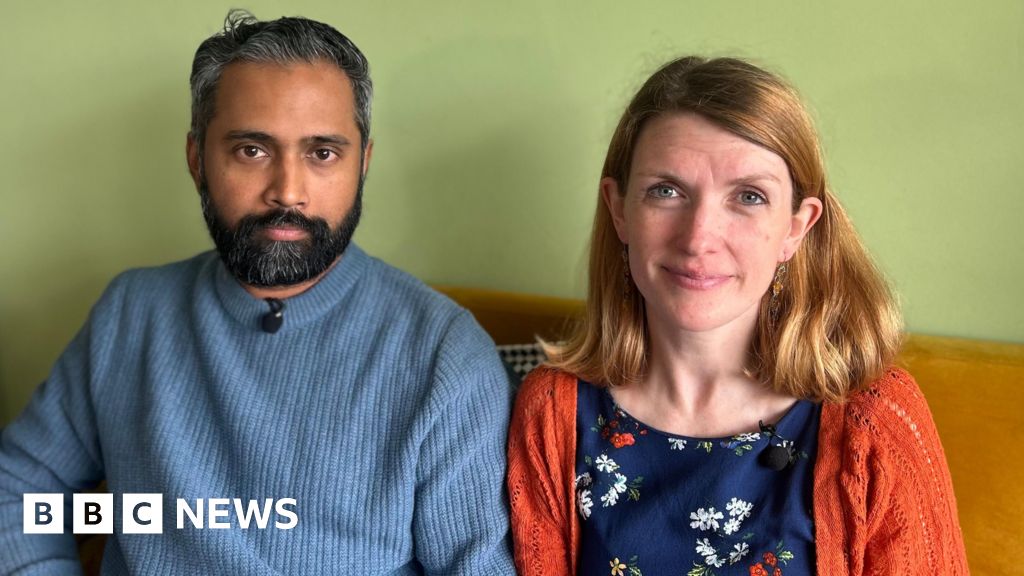We call Northern Ireland home, when do we stop being immigrants?
- BBC News
"When do I stop being an immigrant?"
There may be no more important question for people who come to Northern Ireland to build a new life – particularly for those who arrived years and even decades ago.
Its a question that was asked of Northern Ireland politicians in the wake of rioting that took hold in towns across Northern Ireland in the summer of 2024, by Muhammad Atif, a business owner and trustee of the Belfast Multi-Cultural Association.
He told BBC News NI "things havent moved an inch" for ethnic minorities in the past year, even after scenes of disorder in June, which police described as "racist thuggery".
"Things have not changed and people are not feeling safe. Anybody Im talking to, anybody contacting me, they are not feeling safe," he told BBC News NI.
"Being called an immigrant over and over and over when your second generation is born in Northern Ireland – I personally feel its racist.
"What do I have to do? This is my question. I cant really answer it, to be honest.
"When do I stop being an immigrant?"
In total, 3.4% of Northern Irelands population - 65,600 people - are from a minority ethnic group. That compares to 18.3% in England and Wales and 12.9% in Scotland.
The most recent figures show race hate crimes in Northern Ireland are on the rise.
There were 1,188 between April 2024 and March 2025 - a rise of 349 on the last financial year and the highest since the records began in 2004.
Among the thousands of people who have made Northern Ireland their home who watched violent scenes unfold twice in the last year was Sree Kadalayil, who said it was "unnerving".
"There were times when I thought this is going to kick off and I wasnt very comfortable being in big public spaces," he said.
"There was an underlying feeling of, like – is this safe? Am I safe? Is my child safe?"
Sree moved to the UK more than 20 years ago to study before moving to Northern Ireland for his career in 2006.
Now, he is raising a little boy with his wife Jude Pollock – but even after all these years the couple have experienced racism and hate crime.
"Even when we go to the voting booth, Sree has faced racism going to vote, as if he shouldnt be voting," Jude said.
She said the family had received political flyers through the door that talked about immigration in an "incendiary" way.
"I went to political offices and I handed flyers back. I said: Dont put that through my door," she said.
"You dont know the door youre putting it through. Were a mixed-ethnicity family."
She said the narrative around immigration "serves the agenda to be pointing at others instead of actually fixing the problems that are broken for all the public services".
"People assume Im not my sons mother because we look different," she said.
"But I hope that he learns how to handle it. I hope I can teach him how to handle it well."
Domingas Gusmao is also raising a family in Northern Ireland – she moved here from East Timor 14 years ago.
She was worried the trouble could spread to Dungannon, County Tyrone, where she lives with her husband and three children, who were born here.
"Im hoping that this will never happen again and I can only hope people can be kind to each other, and being kind – it costs nothing," she said.
"But look, you cannot control everybody but you can control how you react to it."
When Domingas first came to Northern Ireland, it was hard adjusting to a new language and culture.
"I tried to talk to everybody," she said.
"Strangers, the taxi driver, colleagues from work, everywhere.
"Thats how I learned English – and watching movies, of course."
Almost 15 years later, she still sometimes feels like an immigrant – but not all the time.
"I also feel like Im part of the community, because the community here, always wants us to be a part of the events," she said.
"They welcome us. Many of our children were born here, so then you get to feel like its not just a place, but its a home.
"And we feel like we belong here."
Muhammad Atif agreed that the majority in Northern Ireland "welcome you with open hand and open hearts".
But that did not make the situation this summer any easier.
"I was taking my children away for a few days after the Ballymena riots and my eight-year-old daughter asked me: Daddy, are we leaving because things are not good here?" he said.
"I had to tell her, no, I booked these flights in advance.
"Thats a difficult conversation to have with an eight-year-old. And this conversation is normal in immigrant households."
Sree said it was an important, ongoing conversation he had with his son.
"Hes aware of his skin colour and how its different from others, but doesnt make him any lesser or better," he said.
"I dont want his worldview to be tainted by a victim complex, for him to think its a big scary world.
"I dont want him to believe every aggression or every reaction of some person towards him is discrimination."
But does Sree still feel like an immigrant? Its complicated.
He used to refer to India as home – but that changed.
"I remember one time landing back into Dublin Airport from India and it was really chilly, and I said to myself: Im home," he said.
"This place has offered me a life, its welcomed me, the people have welcomed me.
"Its given me safety, opportunities. Its given me good vibrations."